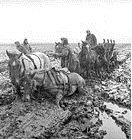Rasputitsa
Posts: 2903
Joined: 6/30/2001
From: Bedfordshire UK
Status: offline

|
quote:
ORIGINAL: loki100
quote:
ORIGINAL: Pelton
Again your ignoring the facts, who won the battle of Smolensk 1941?
Actually, although Glantz vastly over-eggs his thesis, you could say the Soviets did. The battle and its aftershocks lasted from July-October and stalled AGC. It made turning Guderian south an attractive option to the German high command.
You don't always win in a conventional ways. By so badly stalling AGC the Soviets won time and it was that they needed more than anything else.
This will make it possible for strong mobile forces to advance northwards and, in conjunction with the Northern Army Group operating out of East Prussia in the general direction of Leningrad, to destroy the enemy forces operating in the Baltic area. Only after the fulfilment of this first essential task, which must include the occupation of Leningrad and Kronstadt, will the attack be continued with the intention of occupying Moscow, an important centre of communications and of the armaments industry.
Only a surprisingly rapid collapse of Russian resistance could justify the simultaneous pursuit of both objectives. Directive 21.
The diversion of armoured forces from AGC (after Smolensk), to the Leningrad front, was merely continuing the 'Barbarossa' plan. 'Barbarossa' only envisages an immediate continuation of the advance to Moscow, if there is an unexpected collapse of Soviet forces, which obviously had not happened.
The delay in further operations was imposed by the command conflict, as Halder, Guderian and others, try to change Hitler's mind and force an advance on Moscow. When they fail and Hitler insists on sticking with the original plan, Guderian strikes South and wraps up the Kiev operation within 3 weeks. Despite all of the logistical problems the Germans had and whatever the Soviet forces achieve, after Smolensk, the Germans still managed to carry out wide-ranging and opposed operations, over hundred of miles, ending up with re-positioning North again for 'Typhoon'.
The Germans were not forced to go South, Hitler chose to do so (rightly or wrongly), as the destruction of the Soviet army was always the final objective of 'Barbarossa', the conflict in the German high command was about how best to achieve this and a large proportion of the Soviet army was around Kiev. If Halder and Guderian had won their case (that the bulk of the Soviet army would be destroyed defending Moscow), I am sure that the advance on Moscow would have proceeded, despite the logistical difficulties and the resistance the Soviets might have attempted.
It was not only logistics, or Soviet resistance, that imposed the delay, important though they may have been, it was more the German command and control conflict which emerged after Smolensk.
_____________________________
"In politics stupidity is not a handicap" - Napoleon
“A people which is able to say everything becomes able to do everything” - Napoleon
“Among those who dislike oppression are many who like to oppress" - Napoleon
|
 Printable Version
Printable Version












 New Messages
New Messages No New Messages
No New Messages Hot Topic w/ New Messages
Hot Topic w/ New Messages Hot Topic w/o New Messages
Hot Topic w/o New Messages Locked w/ New Messages
Locked w/ New Messages Locked w/o New Messages
Locked w/o New Messages Post New Thread
Post New Thread